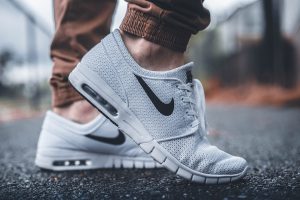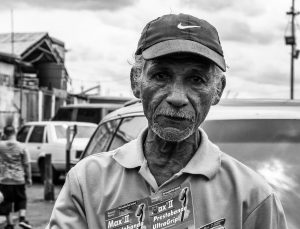The Global Sportswear Market Is Bringing about the Return of Exploitative Economic Practices Long Since Abandoned
by Sean Janion
Are you sitting comfortably? Before answering this question, I invite you to look around at the people near you and note how many are wearing trainers donning the famous tick of Nike. Unless you are reading this in solitude the answer is likely to be high. As one of the world’s biggest global corporations Nike has shown over the years, maximisin g profit requires not only constant and innovative marketing and production, but also minimising production costs. This article will call into question how the competitive industry of sportswear often leads to economic exploitation of the workforce and widespread injustice.
g profit requires not only constant and innovative marketing and production, but also minimising production costs. This article will call into question how the competitive industry of sportswear often leads to economic exploitation of the workforce and widespread injustice.
History repeating itself
Of course, nobody is going to guilt trip you regarding your brand-new Air Max trainers. They may be very nice and you may have worked hard to earn the money with which to buy them. The issue is not with the reception of these goods, but their production. Now, Nike in particular was hammered in the Nineties for their production practices which saw outsourcing of their manufacturing to countries including Indonesia and Vietnam, but since the outcry Nike have made efforts to amend their practices. However, the issue of economic exploitation having a direct relation to economic productivity has not gone away and continues to re-emerge in different forms across the economic world.
The price of production
The issue of the production of goods has long been the thorn in the side of the economic capitalist. It was Karl Marx who claimed “Labour is the substance, and the immanent measure of value, but it has no value itself.” With the production of sporting goods the very nature of human labour is called into question: Is the labour of an Indonesian worth less than that of an English person? Certainly, companies like Nike think so. In this debate there is an inherent quantification of labour occ urring, but remember, without labour there can be no product. Labour is not an expense as big companies now deem it, hence their outsourcing to developing countries; rather, labour is the source of value. The question now is, do we treat it as such? This is not a phenomenon exclusive to Nike, nor the countries it outsources its production to. Closer to home, the price of labour has taken prominence over its value. The workers in a factory are no longer seen as creators and innovators, an essential cog in the production process, they are now simply expenses to be minimized.
urring, but remember, without labour there can be no product. Labour is not an expense as big companies now deem it, hence their outsourcing to developing countries; rather, labour is the source of value. The question now is, do we treat it as such? This is not a phenomenon exclusive to Nike, nor the countries it outsources its production to. Closer to home, the price of labour has taken prominence over its value. The workers in a factory are no longer seen as creators and innovators, an essential cog in the production process, they are now simply expenses to be minimized.
In 2015 Simon Goodley and Jonathan Ashby at The Guardian wrote about the terrible working conditions of the popular sports retailer Sports Direct. The popular retailer has been a feature of many British highstreets for decades and employs 29,000 people in the UK. In their article, Goodley and Ashby highlight the harsh methods used by Sports Direct on their workforce. The CEO of Sports Direct- Mike Ashley, focuses not on improving working conditions for his employees by incorporating new technology for example. Instead, according to one Sports Direct factory worker cited in The Guardian, “It is all paper-based. There are no computers or anything.” In reality, the goal is drawing the maximum value possible from the labourers themselves.
“[Ashely] focuses on building a retail machine whose cogs almost entirely consist of people: cheap people, typically from eastern Europe, who understand little, if any, English. To accommodate them, all signs and announcements inside the building are made in Polish as well as English.”
The endless cycle
So, why do people endure these conditions? The simplest answer is that the only thing more daunting than enduring these conditions for a miniscule wage is not enduring them and receiving nothing. From the example shown above we can see clear exploitative conditions which reduce the value of one’s labour to the working hours they complete. The value is no longer attributed to their production of goods or their performance of services but merely the hours they work.
For the minimum-wage worker in the factory of Sports Direct or Nike, working has become an end, rather than a means, an endless cycle of labou r, production and low-pay. Why then does this cycle endure? As the economist Henry George asks: “How…[do] we explain the obvious facts which lead men to think and speak as though work were in itself desirable?” When we look at Nike we can see that the initially symbiotic relationship between worker and corporation has been altered so that working for Nike is an end for the worker, but simply a means to an end for Nike itself. I reported earlier that the conditions in their factories have improved since the company faced widespread criticism in the Nineties. Despite this, recent figures show Nike as paying workers in Indonesia as little as the equivalent of $3.50 a day. After paying its workers such a miniscule amount for their production, Nike then sells the products of their labour, often for prices exceeding £100. This economic disparity represents a very real problem in our culture. The labourers who work long hours to produce your favourite sportswear are no longer seen as agents in the production process. As we have seen, these labourers are exploitable means to an end which has altered their very nature; their value is now determined by the hours they can work for the smallest possible cost. Companies such as Nike or Sports Direct will actively seek the worker who will work for less, rather than the worker who will question the exploitation of the production process in which they are enveloped.
r, production and low-pay. Why then does this cycle endure? As the economist Henry George asks: “How…[do] we explain the obvious facts which lead men to think and speak as though work were in itself desirable?” When we look at Nike we can see that the initially symbiotic relationship between worker and corporation has been altered so that working for Nike is an end for the worker, but simply a means to an end for Nike itself. I reported earlier that the conditions in their factories have improved since the company faced widespread criticism in the Nineties. Despite this, recent figures show Nike as paying workers in Indonesia as little as the equivalent of $3.50 a day. After paying its workers such a miniscule amount for their production, Nike then sells the products of their labour, often for prices exceeding £100. This economic disparity represents a very real problem in our culture. The labourers who work long hours to produce your favourite sportswear are no longer seen as agents in the production process. As we have seen, these labourers are exploitable means to an end which has altered their very nature; their value is now determined by the hours they can work for the smallest possible cost. Companies such as Nike or Sports Direct will actively seek the worker who will work for less, rather than the worker who will question the exploitation of the production process in which they are enveloped.
Break the cycle
The exploitation of workers is not a new phenomenon, the system in which we find ourselves rests on the mentality that if we can reduce costs, we should, therein lies the problem. Until we view workers as ends within themselves, mistreatment, in one form of another, will continue to be a systemic problem within our economic system.
But, if we make money and can advance within this system, what’s the harm in a little systemic exploitation? Put simply, so long as workers, labourers, people, are viewed as costs to be minimized, this culture of exploitation that goes into making your running shoes will go on and on. The answer then is a wholly alternative approach to global economics; a complete shift in the production and distribution of goods such as the ones featured above, an end to the continuous cycle of exploitation workers constantly face in this system. We not only need to stop this cycle, we need to break the cycle.
